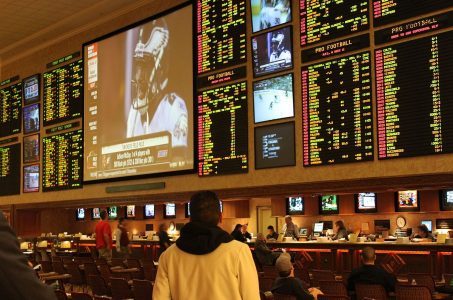New Jersey Sports Betting 2019 Handle Totals $4.58B, Generates $36.5M in Taxes
Posted on: January 14, 2020, 04:15h.
Last updated on: January 14, 2020, 04:52h.
New Jersey sports betting handle totaled more than $4.58 billion in 2019, and taxes on revenue won by the mobile and land-based sportsbook operators delivered over $36.5 million to state and local governments.

The statistics come from the state’s Division of Gaming Enforcement (DGE). The vast majority of the money wagered was facilitated via the internet, with $3.83 billion bet at mobile sportsbooks.
2019 marked New Jersey’s first full year with legal and regulated sports betting.
Of the $4.58 billion wagered, the DGE reports that outcomes for $4.55 billion have been determined – aka the game or event occurred. Football attracted the most bets of any single sport at $939.3 million, and basketball was second at $934.9 million.
Parlays totaled $879.5 million, baseball $698.4 million, and “other” $1.09 billion. Of the completed bets, sportsbooks won $293 million on a hold of 6.4 percent.
State Benefits
New Jersey became the second state after Delaware to join Nevada in getting sports betting up and running following the May 2018 Supreme Court decision that repealed the federal ban. The expanded gambling primarily benefits the state government in the capital city of Trenton – not Atlantic City.
In fact, of the 13 percent tax on mobile sports betting win, and 8.5 percent on land-based revenue, not a single penny remains in the gambling beachfront town. There is a 1.25 percent add-on “investment alternative tax” that is directed to the Casino Reinvestment Development Authority, which facilitates economic and community development in Atlantic City.
That’s different from in Oceanport and East Rutherford – respectively home to the Monmouth Park William Hill and Meadowlands FanDuel sportsbooks. Both towns receive a 0.75 percent share of their venue’s win.
Atlantic City Mayor Marty Small (D) has called on the state legislature to amend the sports betting tax law to provide his town with a direct cut.
Casinos Win Big
2019 was a strong year for the Atlantic City gaming industry.
The nine casinos won almost $3.3 billion. Land-based GGR totaled more than $2.68 billion, a seven percent gain compared with 2018. Internet gaming continued to flourish, with interactive casinos reporting a haul of $482.7 million – up 61.6 percent.
The revenue increase is a positive,” David Schwartz, a gambling historian with the University of Nevada Las Vegas, told the Associated Press. “Overall, what Atlantic City needs right now is to improve its image and marketing and become a destination in a crowded Northeast casino market.”
However, casino profits are down at six of the seven casinos that were in operation prior to the June 2018 openings of Hard Rock and Ocean Casino Resort. Only Borgata has increased its profitability amid the added competition, and it’s marginal at 2.3 percent.
Schwartz isn’t overly concerned.
“Right now, the industry should be in ‘grow-the-market’ mode rather than seeking to consolidate profits, so a decrease in profits isn’t necessarily the worst news,” he explained.
As for total gaming revenue, only two casinos (other than Hard Rock and Ocean, which had easy comparables due to only operating a little more than six months in 2018) reported higher win in 2019. Borgata saw GGR increase 3.5 percent to $797.8 million, while Golden Nugget reported win of $378.4 million – up 15.4 percent.
Bally’s was down 5.4 percent, Caesars 3.7 percent, Harrah’s 6.1 percent, Resorts 3.2 percent, and Tropicana 8.2 percent. It’s worth noting the drops for the three Caesars Entertainment properties don’t include their shared $55.3 million in online gambling revenue, but that’s not enough to offset their overall 2019 GGR declines.
Related News Articles
Maryland Casinos Tell Lawmakers to Back Sports Betting
Outlook Rosy for Sports Betting if Supreme Court Approves Legalization
Derek Stevens Announces Circa Las Vegas Resort and City’s Largest Sportsbook
Most Popular
Mirage Las Vegas Demolition to Start Next Week, Atrium a Goner
Where All the Mirage Relics Will Go
Most Commented
-
Bally’s Facing Five Months of Daily Demolition for Chicago Casino
— June 18, 2024 — 12 Comments
















No comments yet